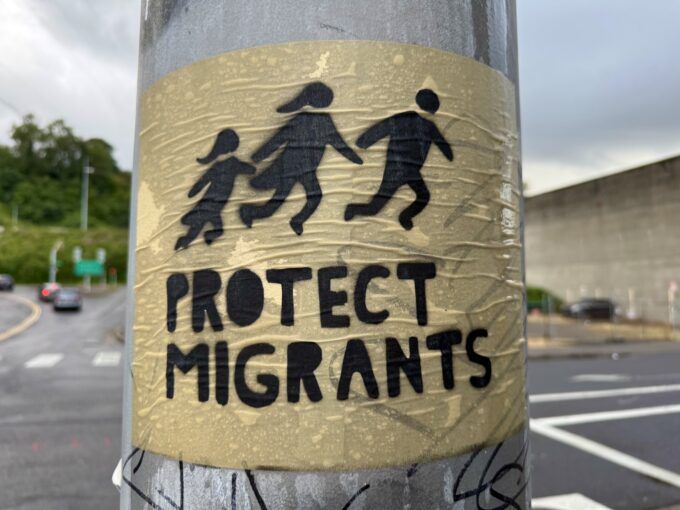California And Noncitizen Immigrant Workers

Photograph by Nathaniel St. Clair
During the pandemic, there were 5.2 million non-citizen migrants laboring for U.S. employers, employees designated essential, e.g., crucial to the society’s daily operation, according to Representative Joaquin Castro (D-San Antonio, Texas). The agriculture industry, which harvests crops for domestic and foreign consumption, is a major employer of non-citizen migrants. In California, which ranks as the world’s fourth biggest economy, with a $4.1 trillion nominal gross domestic product in 2024, agriculture is one of the Golden State’s flagship industries, according to Democratic Governor Gavin Newsom.
The governor, who some speculate may run for president in 2028, has been pushing back against Immigration and Customs Enforcement’s crackdown on non-citizen immigrants in and out of the state’s labor force. As anti-ICE protests grew in Los Angeles and President Trump called out the Marines and state National Guard to quell them, federal immigration policy shifted. The White House last week exempted agricultural workers from immigration raids in part at farms and dining and lodging businesses.
That was then. The Department of Homeland Security, under Secretary Kristi Noem, reversed course recently. This Washington Post article mentions the president “coming under pressure from executives in the agriculture and hospitality industries to loosen up on a sweeping deportation policy that was costing them migrant workers.” The reporters ignored the political impacts of an estimated five million Americans who took to the streets to protest against the president in “No Kings” rallies across the U.S. on June 14. Surely such mass actions registered in the White House and Congress.
Meanwhile, non-legal workers are desperate and vulnerable. Their fear of ICE deportation is real, unlike that of the five U.S. public officials who are American citizens that ICE has arrested recently. Further, in a law enforcement strategy of criminalizing journalists, Mario Guevara, a reporter from El Salvador with a big online following due to his beat of following federal immigration raids, experienced a police arrest while covering a “No Kings” rally outside Atlanta.
Western Center for Agricultural Health and Safety at the University of California, Davis has been holding webinars to inform agriculture employers and employees of their legal rights, according to Heather Riden of the WCAHS. The online trainings cover what workers, employers and their frontline supervisors can do before, during and after ICE immigration raids, using protections from state law and the Fourth and Fifth Amendments of the U.S. Constitution. Over 500 participants logged on to the WCAHS webinars held June 12 and 13, hailing from 36 of 58 California counties, according to Riden.
DHS’s abrupt changes in policymaking can wreak widespread havoc in the business sector. Take the California agriculture industry, where an estimated half of the labor force is noncitizen workers, according to the UC Merced Labor and Community Center. There were 415,300 farm jobs in California in April 2025, down 10,800 from March, according to the state Employment Development Department.
Agriculture trade groups understand what is at stake and why in the ICE immigration raids, which drew large public protests in Los Angeles, and the president’s deployment of the Marines and state National Guard. “It’s hard for employees and companies and takes its toll,” says Michael Miiller, director of government relations with the California Association of Winegrape Growers.
ICE’s on-again, off-again policy of immigration raids is reminiscent of the president’s global trade tariffs, e.g., import taxes. If this is a pro-business approach, perhaps we need a new definition of the term. Speaking of business conditions, immigrants “account for 40.3 percent of entrepreneurs” in California, according to the American Immigration Council.
Regardless of their owners’ national origin, businesses prefer marketplace conditions of reliability to grow and increase profitability. In contrast, marketplace unreliability hampers business growth and profits. On that note, Mayor Karen Bass on June 17 lifted last week’s Downtown LA curfew that in part slammed small firms, some of which employ undocumented workers. “The curfew, coupled with ongoing crime prevention efforts, has been largely successful in protecting stores, restaurants, businesses and residential communities from bad actors who do not care about the immigrant community,” the mayor said in a statement.
Will Democrats pull back on ICE as its immigration raids deplete the noncitizen labor force and push employers to hire native-born replacement workers at higher wages? Will the GOP stick with the White House’s stance on immigration raids as the U.S. midterm election approaches? The economics and politics of these policy choices are immense. One more impact is clear, though perhaps less visible. The human toll of pain and trauma from federal immigration raids will continue for a long time.
The post California and Noncitizen Immigrant Workers appeared first on CounterPunch.org.
Popular Products
-
 Portable Car Jump Starter Booster - 2...
Portable Car Jump Starter Booster - 2...$261.99$182.78 -
 Foldable Car Trunk Multi-Compartment ...
Foldable Car Trunk Multi-Compartment ...$257.99$179.78 -
 Mommy Diaper Backpack with Stroller O...
Mommy Diaper Backpack with Stroller O...$106.99$73.78 -
 Ai Dash Cam with Front & Rear HD, GPS...
Ai Dash Cam with Front & Rear HD, GPS...$304.99$212.78 -
 Smart Auto-Recharge Robot Vacuum Cleaner
Smart Auto-Recharge Robot Vacuum Cleaner$472.99$306.78